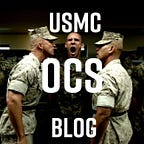My Journey from Civilian to Marine Officer, Part III: TBS
Thank you to Lieutenant Schmuckatelli, a new Infantry Officer, who is sharing his journey through OCS and TBS with us.
The Basic School: You’re Not at OCS Anymore
After 10 weeks of being a high-strung candidate having every waking moment scheduled for me, I was now a Commissioned Officer beginning the Basic Officer Course at TBS. Instead of a squad bay, I had a barracks room that rivaled most college dorm rooms. I traded in my 42 platoon mates on bunk beds for a single roommate. Rather than “LIGHTS LIGHTS LIGHTS”, we had an on deck time and were on our own to be ready.
Every Marine Officer a Provisional Rifle Platoon Commander
[caption id=”attachment_4199" align=”aligncenter” width=”548"]
Land Nav with a lensatic compass. And the buddy system.[/caption]
For six months, we would learn the skills necessary to be a provisional rifle platoon commander. If every Marine is a rifleman, every Marine Officer is a provisional rifle platoon commander — regardless of MOS. Due to this expectation, our TBS platoon had future grunts (YUT!), future logisticians, future pilots as well as communications, supply and admin…everything. Instead of being pass/fail like at OCS, we would now be ranked in our company of 300 newly commissioned lieutenants. Military skills, leadership and academic performance would all factor into our class standing and ultimately into our MOS later on in the course.
Unique Aspects of TBS
[caption id=”attachment_4578" align=”aligncenter” width=”548"]
A Marine supervises from the center of The Basic School permanent personnel battalion during a 10-mile hike aboard the westside of Marine Corps Base Quantico on June 28, 2013. The hike was the first hike The Basic School has done for regimental physical training in the last 3 years.[/caption]
Putting the responsibility and freedom aside, one of the initial major differences we noticed were the billets. Rather than having a billet for 3 days, billets now lasted for 2–3 weeks. It gave you more responsibility but you were able to get your unit (Platoon, Squad, Fire Team) into a rhythm which eventually made things run efficiently. A dramatic change from the constant chaos of ever-changing billets at OCS.
Another new element of our training that we would come to love and hate was Socratic Questioning by our instructors. Where OCS you were told exactly what to do and the correct way to do things, instructors at TBS will never just GIVE you the answer. They will answer your questions with other questions aimed at getting you to think critically about the problem and arrive at a solution yourself. This method is wildly frustrating at the beginning, but by your last field exercise it becomes second nature.
If OCS trains you to immediately follow instructions, TBS trains you to think critically and solve problems.
Don’t expect anyone to hand you the answers or tell you how they would do it. You should fully expect to view problems as officers and find a solution.
Friction and the Fog of War
One thing that didn’t go away but was used in a slightly different manner is friction. Instructors will induce friction on your decision making process in order to simulate the stress of battle as best as possible since they can’t actually shoot at you. I mentioned it earlier, but as college graduates we tend to over complicate things and try and plan for every contingency. TBS stresses achieving the 70% solution. You’ll never have all of the information you want and we had to get used to making a decision and taking action on 70% of the information we need. You’ll constantly hear General Patton’s quote, “A good plan violently executed now is better than a perfect plan executed next week.” Our Sgt Major told us that they give us a 1,000 piece puzzle that is missing 100 pieces and 300 pieces are from a different puzzle and we need to figure it out. Get used to the idea.
TBS: Officer Boots
TBS is where you really start to feel like an officer. You learn to make decisions and trust your judgement. It’s that switch that you carry with you in and out of the uniform. Stay healthy, stay aggressive and soak up as much information as you can. Six months goes by quickly and when it’s over your enlisted Marines are going to be looking to you for the answers. Don’t let them down.
All the Infantry Officer Course Tips I Can Share:
It sucked.
[caption id=”attachment_4543" align=”aligncenter” width=”548"]
Training day one at IOC[/caption]
